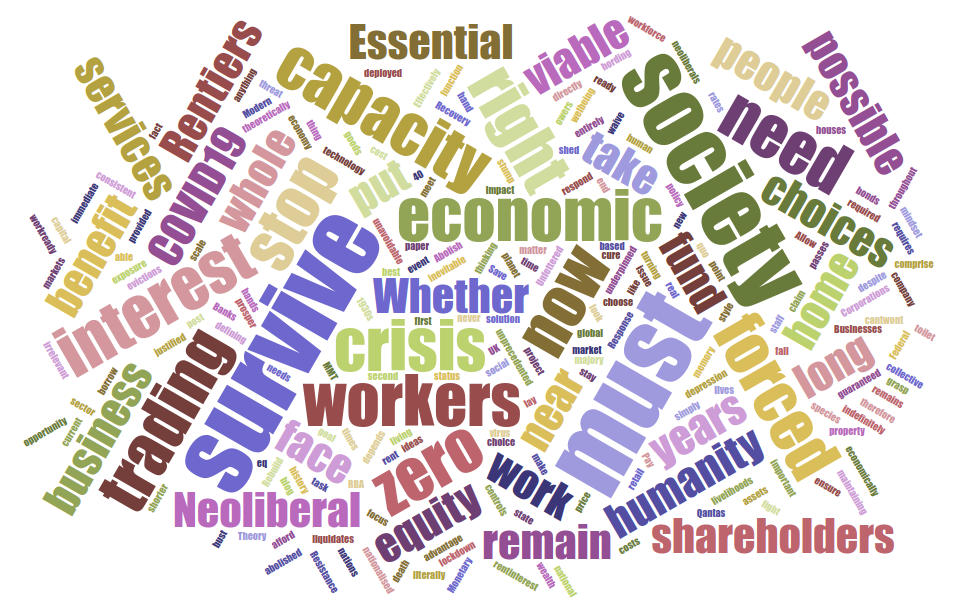COVID-19 Response and Economic Recovery
 The economic and social impact of COVID-19 is unprecedented in living memory but a 1930's style depression is not inevitable.
It depends on how we choose to respond.
What is unavoidable is the end of the "neoliberal project"
which has underpinned economic policy for 40 years.
The economic and social impact of COVID-19 is unprecedented in living memory but a 1930's style depression is not inevitable.
It depends on how we choose to respond.
What is unavoidable is the end of the "neoliberal project"
which has underpinned economic policy for 40 years.
Corporate "free market" capitalism simply does not work in a time of crisis.
That much is obvious to everyone right now.
However, for most of humanity it has not been working well for decades but we've always been told "there's no better economic system" or it's "too risky to change it".
Not anymore.
We do not need to suffer catastrophic economic loss or widespread loss of life or livelihood. We have never before had the technology, ideas and raw productive capacity to survive this crisis and prosper beyond it than we do right now.
It all depends on the choices we make.
What are those choices?
- Save lives first and livelihoods second.
- Rebuild our economies with a focus on welbeing.
- Do this consistently with protecting our planet.
What does this look like?
- Allow business forced to cease trading to stop paying affected workers.
- Pay those workers directly to stay at home and survive.
- Abolish evictions and waive rent, mortgage and other loan payments.
- Put price controls on essential goods and services.
- Effectively we put the economy into hibernation.
Why is this justified?
- It's not possible to function as before while the virus has no cure.
- Businesses forced to stop trading do so for the benefit of society.
- People need to survive at home in lock-down.
- Society as a whole (via Government) must therefore fund this directly.
- Essential services must be guaranteed.
What about Rentiers, Banks, Corporations and Shareholders?
- Any of these forced to stop trading may shed labour costs (as above),
- Rentiers and banks survive waived rent/interest because they have near zero interest costs,
- if they need more to survive they can borrow against their assets at near zero interest,
- if they need more to survive, shareholders stump up,
- if they can't/won't, the entity liquidates, or
- if it's too important to fail, it's nationalised.
How long do we do this?
Until we cure the disease and the crisis recedes.
This could take years.
How can we afford it?
The long and theoretically consistent answer is provided by Modern Monetary Theory #MMT.
The short answer is that the government sector (Federal Government and RBA) can fund anything required, indefinitely. It does not matter about the markets; equity, bonds or property. They are irrelevant to the immediate task at hand.
The overriding goal must be to maintain the productive capacity of our society to meet the needs of the people that comprise it. This requires able workers and productive capital ready and willing to be deployed when possible. The workforce must therefore remain work-ready and business must remain viable (albeit in hibernation) until the crisis recedes.
This is not the same thing as maintaining the same ownership of our nation's productive capacity. Beyond the virus itself, resistance to this fact is the real threat we face because the current owners will fight to the death (literally, yours, not theirs) to maintain the status quo.
The issue of our time is equity for the benefit of society to ensure society itself remains viable. Whether it's toilet paper, houses, or wealth, hording must be abolished from our collective mindset.
This is the opportunity before us.
If we're willing to grasp it.